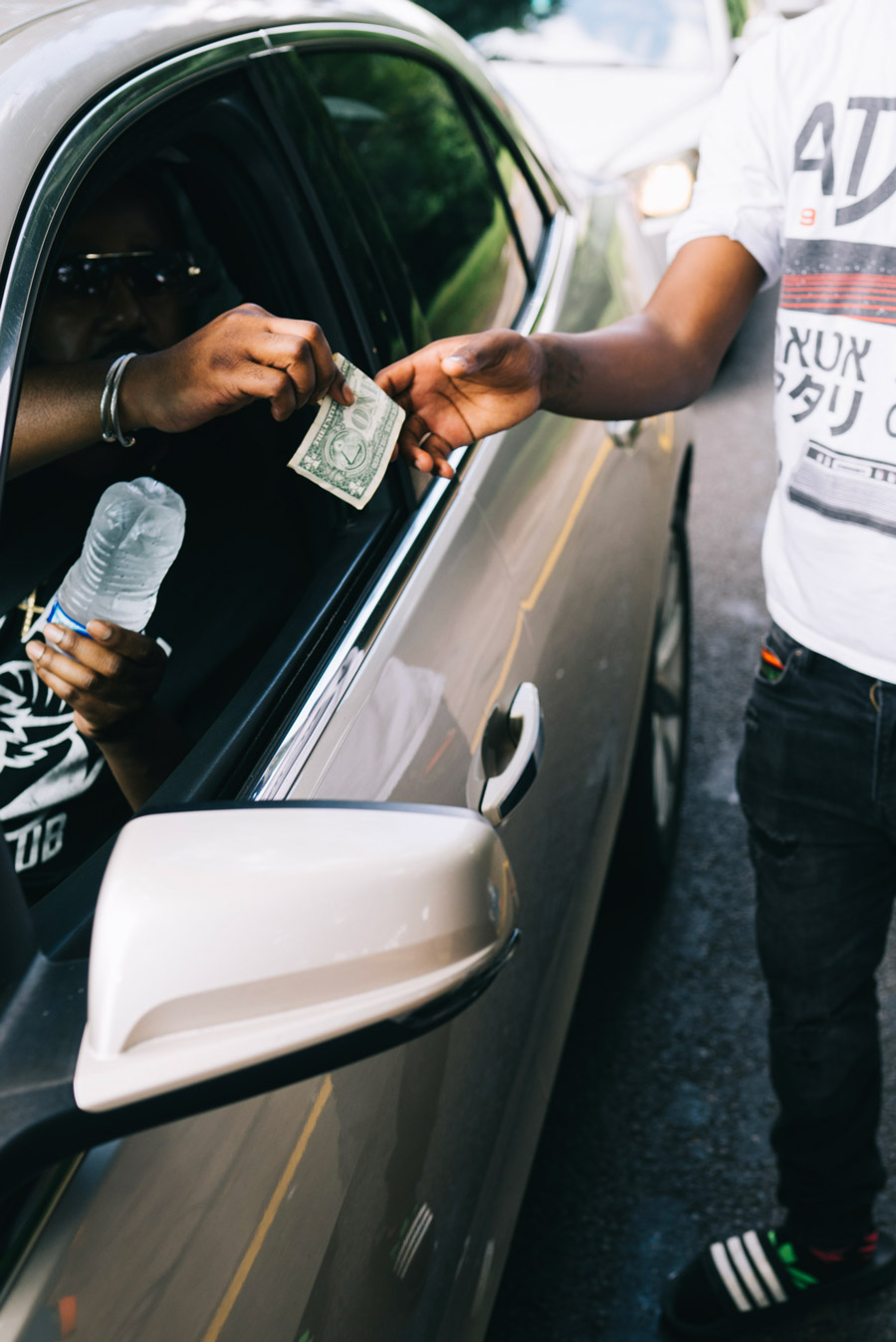
Photograph by Aboubacar Kante
This story was produced by Canopy Atlanta, a community-led journalism project, and supported in part by the Economic Hardship Reporting Project. More than 50 West End community members helped choose this story’s topic this past summer.
• • •
Baby D is getting ready to start his shift. Few cars are pulling off Interstate 20 at the Joseph E. Lowery Boulevard exit, but churches across Atlanta are letting out, so he knows traffic will pick up soon. He runs for a blue cooler hidden in the woods, which contains a few stray bottles from the day before. After rinsing the cooler with the leftover liquid, he walks a couple blocks to Family Dollar for a 24-pack of water bottles, followed by a stop at Chevron for a 10-pound bag of ice. He dumps it all into the container, pulls up his face mask, and heads up the ramp toward the expressway.
It’s a sweltering Sunday morning at the tail end of August, and the short 16-year-old is wearing a white long-sleeved T-shirt, jeans, tube socks with marijuana leaves on them, and Adidas slides. A line of roughly 15 cars forms at the stop sign. Baby D scans the vehicles to see which ones might roll down their windows with a few bills in hand. Moments later, an older Black man rolls down his car window. Baby D charges $1 for a bottle of water, but the man gives $10 and tells him to keep the change. It’s the first sale of the day.
Born and raised in West End, Baby D has regularly sold water for the last year at the eastbound exit near Morehouse College. Like a lot of teens with summer jobs, his goal is to save enough money for a car. Nothing fancy. He’s seen enough to know he wants something reliable. Maybe a Toyota or, if he’s lucky, a new Nissan. The chance to cruise throughout the city is a freedom that once seemed out of reach, particularly last year, when he spent some time in jail. If he can sell water for just a little longer, he might just be able to turn those car-owning dreams into reality—which, he hopes, might earn him enough social currency to impress girls.
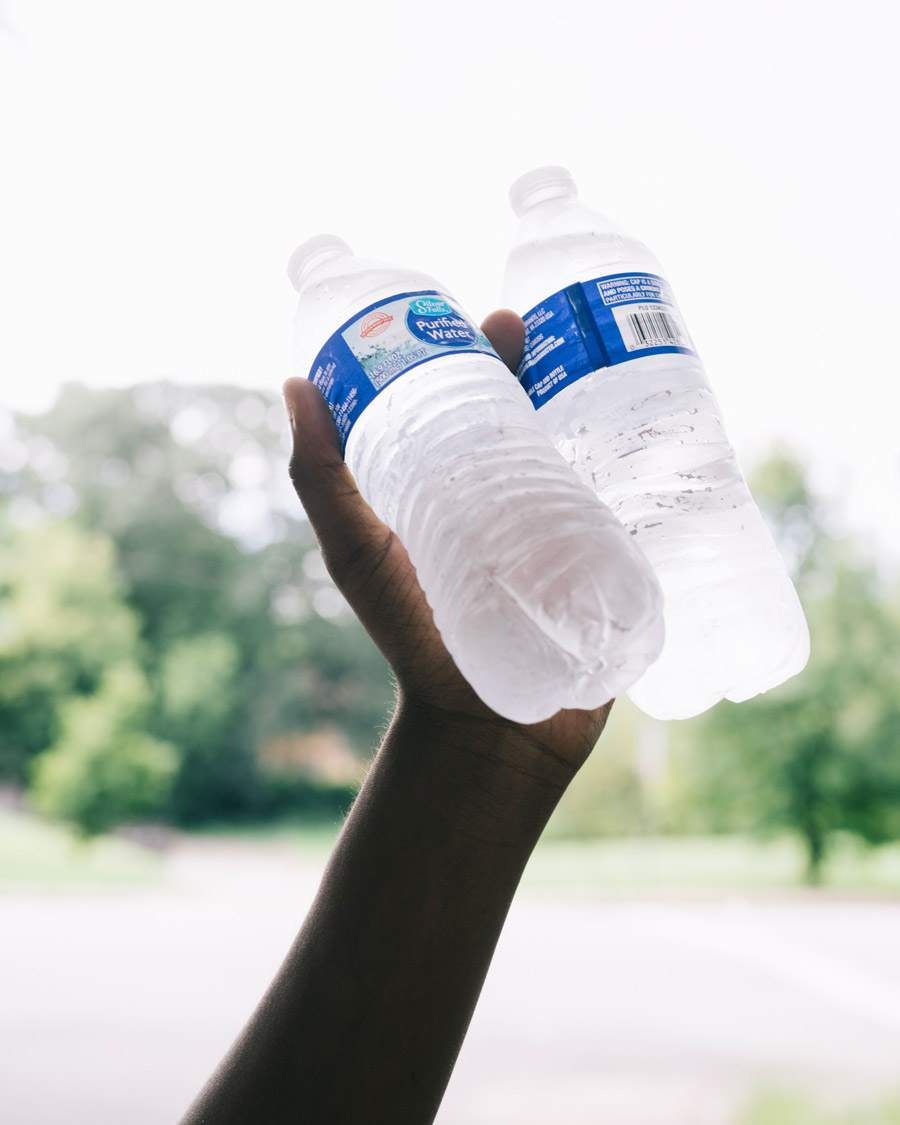
Photograph by Aboubacar Kante
But not everyone is interested. Ten rejections follow. Out-of-towners with South Carolina and Alabama plates look ahead to the stop sign to avoid eye contact. Elderly couples in their Sunday best smile and nod, but don’t dare roll their windows down. Others flash their beverages, hoping to save Baby D a few steps. He passes quieter moments by rapping along to his favorite Lil Baby songs playing on his phone. He mouths words to the track, “Freestyle,” out loud to himself.
They just know I’m gettin’ bigger
They just know a n**** busy
I been runnin’ up them digits
True to the lyrics, Baby D makes $100 in the first hour of his shift. That’s more than he’d make in a day’s work stocking shelves or mowing lawns. Plus, there’s no supervisor to tell him when to clock out. “I can do what I want,” he says. “I got more freedom.”
At that moment, he spots an Atlanta Police Department SUV coming down the ramp. Baby D, now joined by two friends, freezes. He knows the biggest threat to his dreams of cruising down Lowery in a new car is the wrong kind of run-in with the police. That freedom could vanish with the flash of blue lights.
• • •
The recent controversy over Atlanta’s “water boys”—Black teenagers who sell ice-cold drinks to motorists—had quietly bubbled under the surface for months. Last December, a passing driver near Atlantic Station called police about a suspicious person at a well-known water selling spot, possibly selling drugs: a teenager one year older than Baby D standing on a median. When an officer—skeptical the youth would indeed be selling drugs in broad daylight—approached, the teenager ran, climbed a fence, and fell almost 30 feet to the highway below, shattering his legs. The officer never found drugs but noted in a report that two water bottles dropped out of his jacket as he fled.
Months later, even as the pandemic, police violence protests, and a presidential race consumed America’s attention, the water boys broke through the headlines. Shortly after the death of Rayshard Brooks, a young man shot and killed 18-year-old Jalanni Pless in Midtown, allegedly over competition for $10. Around the same time, police arrested a 14-year-old teenager for allegedly threatening people with a gun while selling water in Buckhead. One highway stop over from where Baby D sells water, a water boy twice shot a driver during a dispute.
Between January and July, Atlanta Police received nearly 700 calls related to youth selling water, according to APD data. Whereas some residents criticized the water boys for breaking the law, endangering themselves, and creating public health risks by approaching people’s cars at times without masks, others saw them as a key example of why the public should have fewer police encounters. Supporters argue that in a time when tensions between the Black community and law enforcement are high, and when many youth opportunities are shut down due to the pandemic, kids should be free to make money without any police involvement. Faced with protests over subsequent alleged police brutality directed at the “water boys,” Mayor Keisha Lance Bottoms formed an advisory council to suggest safer alternatives for teens like Baby D.
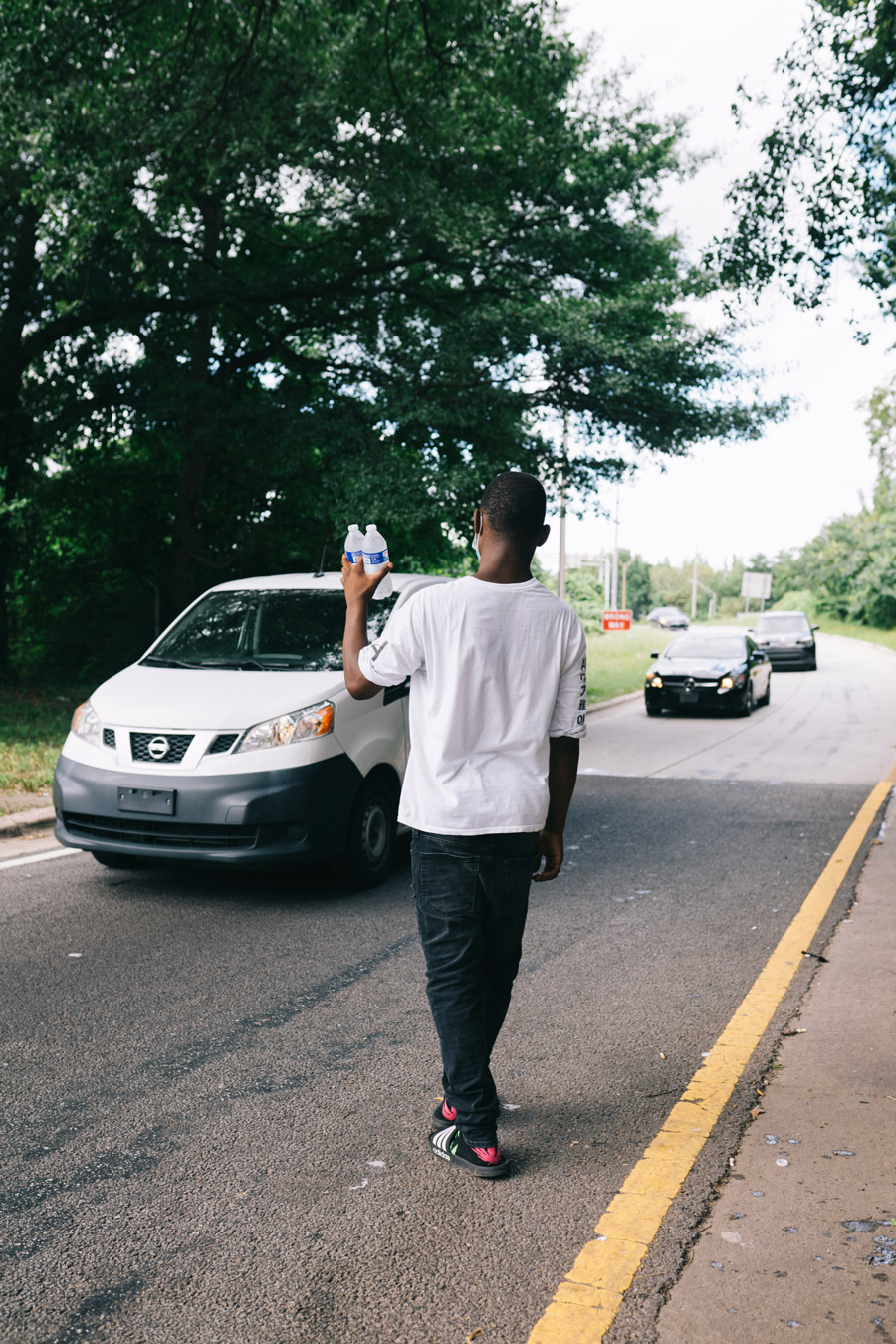
Photograph by Aboubacar Kante
The council—composed of Atlanta residents, nonprofits, entrepreneurs and municipal leaders, with input from the APD and teens selling water in different neighborhoods—has offered 13 recommendations that urged city officials to recognize the entrepreneurial energy of the youth, collect more data to understand the issue and develop authentic, credible youth outreach opportunities. One of the council co-chairs, Jay Bailey, president and CEO of the Russell Center for Innovation, says he was blown away by the teens’ resolve. Bailey jokes that he was a water boy before water bottles existed, having started his first business at age 12. He relates to their experience of being a young Black kid with summer hustles. Through their interviews with youth and APD, the council learned that the kids are sometimes the breadwinners of their families, and officers don’t want to arrest them. However, the water boys are breaking laws.
Indeed, the report notes that the youth selling water are violating city ordinances and state statutes, including vending without a license, obstructing traffic, pedestrians on or along the roadway. The council also found that hundreds of kids like Baby D selling water have no intention of stopping their sales, no matter what incentives or alternatives are offered. As someone who’s involved with youth programs associated with organizations like the Wren’s Nest, Bailey believes city officials are not going to be able to “program our way out of this problem” and must find alternatives that serve the needs of the entrepreneurial teens.
“We cannot depend on the police to solve our problems with our youth,” Bailey says. “This is a rallying cry for solutions that come from the community, for the community. This is not a one-program fix.”
• • •
The police SUV never flashes its lights. Once their worries subside—and they see that the officer is an attractive young Black woman—Baby D and the other timid teens turn into schoolboys with puppy-love crushes. Being teenagers, stares and catcalls follow, along with requests for her to follow Baby D’s crew on Instagram.
Baby D’s focus quickly shifts back to the ramp. As cars pass by, he’s hesitant to tell me stories about his upbringing or the origins of his nickname. One of the stories he doesn’t mind sharing is how he began selling water: He was in a detention center when he heard someone talk about the big business of being a water boy. “They were saying they made like $5,000 a year,” Baby D said. “So then I started doing it when I got out.”
Tattooed across his neck are the words, “Long Live DaDa,” an homage to the late grandfather who schooled him on how to make money. DaDa was from Louisiana, and a bit of that Bayou State drawl comes out in Baby D’s words. His parents are fine with his occupation, and he’s happy to not ask them for financial help. Selling water keeps him from “striking,” aka robbing and stealing, and beats the job alternatives he says have been offered by the city and others who have approached the boys. And he’s very good at what he does. He once made $400 in a day.
“They were trying to get us to work for Waffle House,” he says. “They are trying to pay us $9 an hour—hell nah! We make $50 an hour up here. We don’t make no $9!”
The money is easy, but Baby D says law enforcement can make it hard. He says he’s seen officers confiscate water, trash coolers, and dump ice. He says police also sometimes take products and supplies from the boys, then redistribute them to homeless men panhandling on the ramp. But in the rare case that a water boy is apprehended, police take them home to their parents.
APD spokesperson Chata Spikes says she was unaware of such practices but noted that the department was originally not in a position to store confiscated water in its property control unit—a policy that has since changed.
The teens see the reward as worth the risk. Baby D’s friend, who goes by Triplecross, is a taller kid dressed in all black who also lives in West End. He explains the rules of selling water. It’s essentially every man for himself on the ramp, but profit shares come in the form of the “bust down.” When a driver offers up bills of $20 or larger and wants no change in return, the water boy who secures the money is expected to split the cash with the people who chipped in for water and ice. That’s why two to three boys will approach a vehicle at a time—because if you’re the first to make physical contact with the money, you’re guaranteed a cut.
“It’s a business. We just ain’t got no store,” Triplecross explains.
“It’s a business. These folk just be scared,” Baby D interjects, referring to the more timid customers, who he says believe everything negative reported about the water boys in the local news.
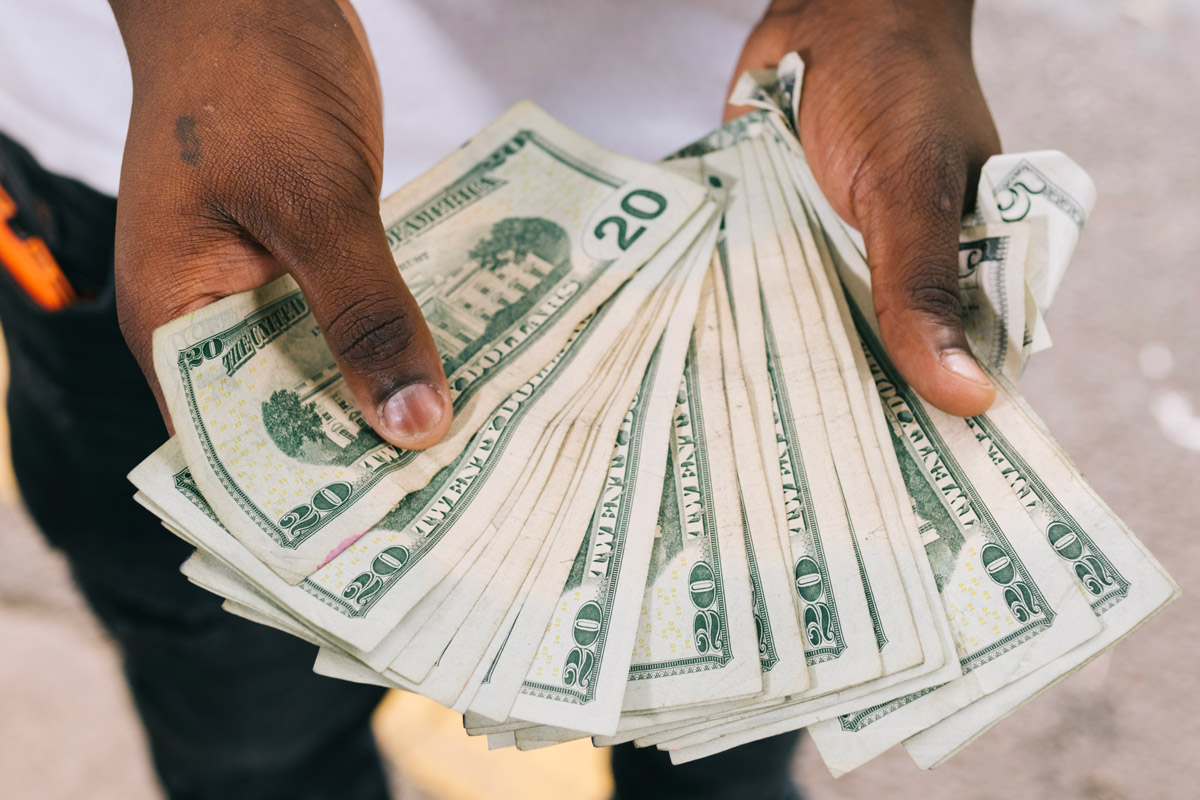
Photograph by Aboubacar Kante
Right then, two new kids emerge from the nearby Chevron. One of the boys, a shorter, louder kid with dreadlocks, is carrying a 32-pack of water. He’s wearing a utility pouch that’s carrying a pistol. It’s not to intimidate water competition. The newcomer mentions a crew of youth known as “Mayhem” who have been terrorizing other kids in West End and the metro area. He needs it for protection, but it’s obvious the presence of more sellers and firearms irks Baby D.
His concern proves valid. Three white cars—a Range Rover, Mustang and Corvette—all stop near the exit and roll down their windows. Baby D’s crew takes off sprinting in the direction of the vehicles, anticipating a flurry of bigger bills to be released. Their hardened hustler machismo gives way to giddiness, like schoolboys seeing an ice cream truck approach.
The pugnacious newcomer with a gun grabs a $50 bill from the Range Rover. Baby D and Triplecross surround him, anticipating a cut of the bust down. That doesn’t happen. Though Baby D felt that a shared exit ramp meant shared profits, this new duo brought their own water, and Baby D and Triplecross didn’t chip in for that.
Baby D grows frustrated at what he felt was a violation of the ramp’s unwritten rules. He grabs the duo’s water bottle pack and tries to throw it over the fence. Instead, it climbs halfway up toward its goal, crashing back to the earth. The bottles spill out onto the dirt.
• • •
Drivers passing by Baby D, Triplecross, and the other teens like to offer unsolicited advice. A woman who often drives by tells them to be safe. Another woman in a beige sedan creeps and barks: “You guys aren’t going to get anywhere doing this!” Next, a red pickup truck with the Batman logo on the side pulls up to the boys.
The driver, a middle-aged Black man named Bernard Todd Sr., offers words of wisdom. From the driver’s seat, he asks Baby D and Triplecross why they’re selling water and what they’re saving for. The former talks about the car he’s been dreaming of, while the latter says he’s just saving—no end goal in sight. Todd hands the boys his card and insists that they reach out to him when they want to start a business or simply just need help.
A southwest Atlanta resident, Todd has three of his own businesses and, as a youth, worked odd jobs from delivering groceries to mowing lawns. His sons were the subject of a documentary on YouTube about Atlanta “water boys”: The oldest used his water hustle to invest in a mobile gaming truck, which is now his main source of income. So, that’s why Todd Sr. offers mentorship on everything from how to dress, what to wear, when to approach a vehicle, and how to speak with customers. He’s even spoken up on behalf of “water boys” at Atlanta City Council meetings.
“All of these young boys ain’t trouble,” he says. “They just don’t have the right guide and nobody to show them, so they’re learning from each other.”
But West End residents like Vonda Henry have had enough. The former president of West End Neighborhood Development (WEND) is tired of the litter she attributes to the youth selling water, as well as their “aggressive” sales tactics. She doesn’t believe most of the boys selling water in West End actually live there and questions their motivations. Unsurprisingly, Henry has never purchased water from the boys.
“They don’t realize that they’re being allowed to be there,” she says. “If the neighborhood decides that they don’t want them there, they will not be there, because the law is not with them.”

Photograph by Aboubacar Kante
Following the advisory council’s report, city and police officials are now considering which solutions to pursue. They found one successful model up in Baltimore, where, last year, officials launched the Squeegee Alternative Plan, designed to curb young men of color who were squeegeeing car windshields downtown. The program developed growth plans for the youth cleaning cars, assigned mentors, facilitated reengagement in school—all to get the kids off the corner. Within 10 months, the effort led to a decrease in 911 calls and an uptick in kids switching street hustles to full-time jobs. A few miles east of West End, officials in DeKalb County are considering a similar youth entrepreneurship program for those selling water. Instead of writing tickets or arresting teens, police would send them to a six-week training program that comes with a stipend.
In Atlanta, Bailey says local organizations such as Helping Empower Youth (HEY!) are also doing their part. Recently, the nonprofit adopted the corner of Ivan Allen and Joseph E. Boone boulevards, where adults help guide young boys in making water sales. There’s also the Corner Boys program from I’m A Father F1rst, which provides an entrepreneurship curriculum for what they called “bottle boys.” Like mentors in those programs, Todd listens patiently and doesn’t get discouraged when Baby D can’t imagine any other legal hustle that would make him stop selling water. Todd says he gets it. He sees himself in Baby D. Still, he reminds the teens that the goal should be to work their way off the exit ramp.
“Even if you’re making $30 an hour, it still doesn’t do anything to a person who doesn’t have guidance on what to do with it,” Todd says. “We can be of guidance to them.”
• • •
Since school started in early September, Baby D has juggled virtual classes and selling water, which he’ll keep doing until the weather cools. He just needs enough money to get him through to the spring. He doesn’t have a favorite subject because school is more about potential interactions with girls than what’s happening on Zoom, he says. As a young man making money independently, he’s confident in his game even if girls from class have seen him on the exit ramp and make jokes about it later.
Baby D looks down at Todd’s business card. Once the red truck drives away, the teen tosses it to the dirt ingrained with bottle caps and used condoms. He and Triplecross say folks like Todd, Bailey, and others are simply “trying to flex cuz they on camera”—in front of a reporter and photographer—and that ultimately they “want all the water boys incarcerated.”
A homeless man approaches carrying a 24-pack and a bag of ice over his shoulders. It’s Baby D’s re-up. The man drops the goods on the ground. Baby D hands over $3 and tells him, “Thank you, Unc,” short for Uncle. It’s a term of endearment given to anyone older than the boys. He’s making a killing today because, thanks to the cheap labor, he hasn’t needed to leave the spot yet.
Before he drove away, Baby D told Todd that he’ll most likely keep selling water. It’s easier and safer than some of his previous gigs. “I used to steal cars,” he admits. “If they stop this, then I’m going back to doing what I used to do.”
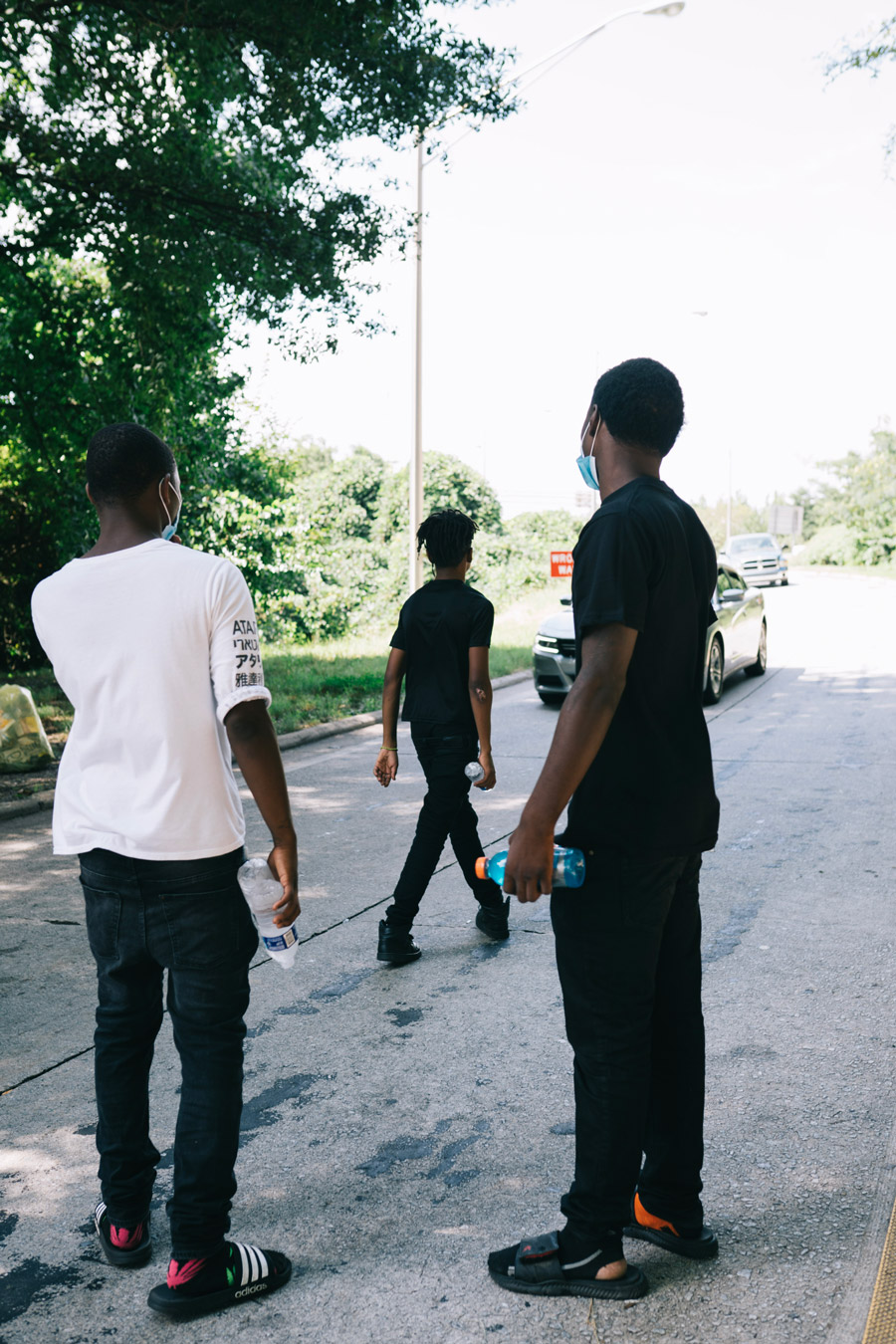
Photograph by Aboubacar Kante
For now, Baby D isn’t particularly concerned with news headlines, or how schoolmates, residents, and would-be mentors judge his means to make money. He doesn’t dwell on what the city’s plans to address water boys are, or if the police will continue to randomly crack down on him and friends. Like any other teenager, he just wants financial independence from his parents, and a chance to talk to crushes in person once again.









![The North Carolina Museum of Natural Sciences’ newest exhibit is a [pre]historic first](https://cdn2.atlantamagazine.com/wp-content/uploads/sites/4/2024/04/DD-3-100x70.jpg)



